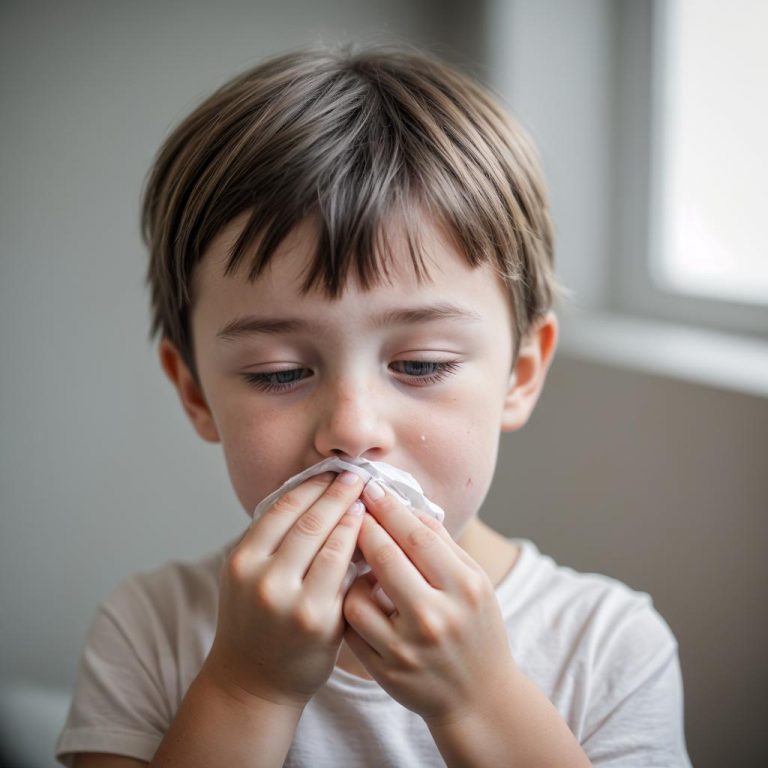
Allergies are increasingly prevalent in today’s society, affecting people of all ages, including young children.
For parents of 5-year-olds, managing allergies can be particularly challenging due to the child’s young age and limited ability to communicate symptoms effectively. Understanding the causes, symptoms, and management strategies for allergies in 5-year-olds is crucial for ensuring their health and well-being.

Common allergens in 5-year-olds
Children at the age of 5 can develop allergies to a variety of substances, including:
Food: Common food allergens include milk, eggs, peanuts, tree nuts, soy, wheat, fish, and shellfish. Food allergies can manifest as skin rashes, gastrointestinal issues, respiratory problems, or anaphylaxis.
Environmental: Allergens such as pollen, mold, dust mites, and pet dander can trigger allergic reactions in children. Symptoms may include sneezing, runny nose, itchy eyes, and skin rashes.
Insect Stings: Some children may be allergic to insect venom from bees, wasps, hornets, or fire ants. Allergic reactions to insect stings can range from localized swelling and redness to severe anaphylaxis.
Recognizing allergy symptoms
Recognizing allergy symptoms in 5-year-olds can be challenging as they may not always be able to articulate their discomfort. Parents should watch for the following signs:
Skin Reactions: Redness, itching, hives, or eczema may indicate an allergic reaction, especially after contact with a potential allergen.
Respiratory Symptoms: Persistent coughing, wheezing, nasal congestion, sneezing, or difficulty breathing could suggest allergies, particularly in response to environmental triggers.
Gastrointestinal Issues: Symptoms such as vomiting, diarrhea, abdominal pain, or bloating after consuming certain foods may indicate a food allergy.
Behavioral Changes: Irritability, restlessness, or changes in mood or behavior could be indicative of an allergic reaction, especially if they occur shortly after exposure to a potential allergen.
Diagnosis and treatment
If parents suspect their 5-year-old has allergies, they should consult a pediatrician or allergist for proper diagnosis and treatment. Diagnostic methods may include:
Skin Prick Test: This common allergy test involves placing a small amount of allergen extract on the skin and pricking the skin’s surface to see if a reaction occurs.
Blood Tests: Blood tests, such as specific IgE tests, can measure the levels of allergy-related antibodies in the blood to identify allergens.
Elimination Diet: For suspected food allergies, a healthcare provider may recommend eliminating certain foods from the child’s diet and reintroducing them gradually to identify triggers.
Treatment options for allergies in 5-year-olds may include:
Antihistamines: These medications can help relieve symptoms such as itching, sneezing, and runny nose caused by allergies.
Epinephrine Autoinjector: Children with severe allergies, especially to foods or insect stings, may need to carry an epinephrine autoinjector (e.g., EpiPen) for emergency treatment of anaphylaxis.
Allergen Avoidance: Identifying and avoiding allergens is essential for managing allergies in children. This may involve making dietary changes, keeping the home environment clean, and minimizing exposure to known allergens.
Supporting children with allergies
Parents, caregivers, and educators play crucial roles in supporting children with allergies:
Educate: Teach children about their allergies, including what allergens to avoid and how to recognize and manage symptoms.
Communicate: Maintain open communication with teachers, caregivers, and other parents about your child’s allergies and emergency action plan.
Create a Safe Environment: Ensure that environments where the child spends time, such as home, school, and daycare, are allergy-friendly and free from potential triggers.
Empower: Encourage independence in managing allergies as age-appropriate, such as teaching children how to use their epinephrine autoinjector.
Allergies can significantly impact the quality of life for 5-year-olds and their families. By understanding common allergens, recognizing symptoms, seeking proper diagnosis and treatment, and providing support, parents can help their children effectively manage allergies and lead healthy, fulfilling lives. With the right knowledge and resources, navigating allergies in young children can become more manageable and less daunting for everyone involved.



